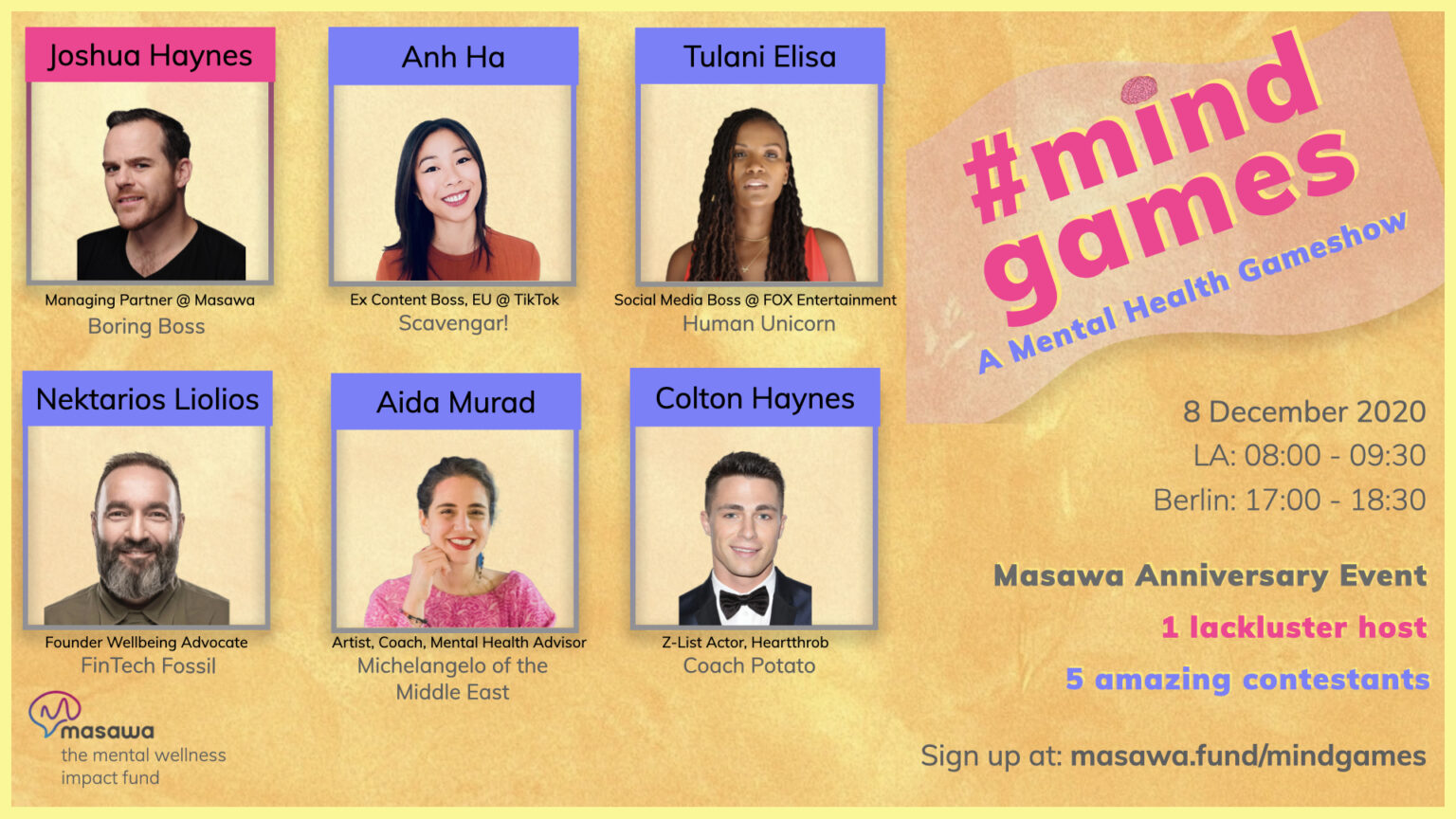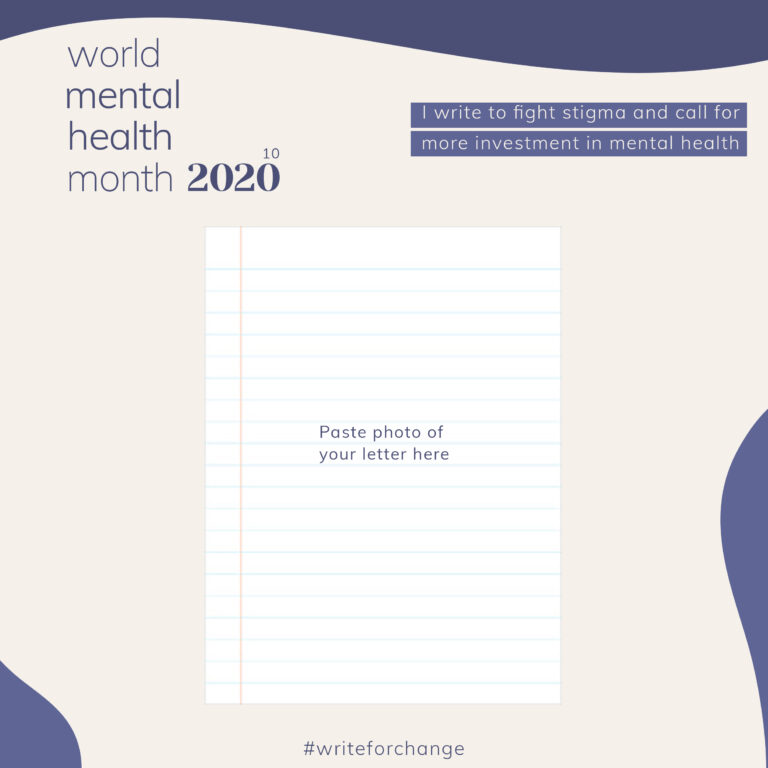11 December 2020 by joshua
Tuesday, we hosted our 1st anniversary gameshow, #Mindgames, which was a great success, thanks to our five incredible contestants. It was fun, we played some games and had some open and honest conversations about mental wellness. To those of you who couldn’t be there – don’t worry, we’ve got you covered. We’ve recorded the whole thing so that you could watch too. Enjoy!
23 November 2020 by joshua

Get ready for 90 minutes of radical honesty, awkward jokes, ridiculous challenges and a moderate amount of fun in Masawa’s first gameshow with five incredible contestants! It might not be the best gameshow you’ve ever seen (unless you don’t watch gameshows very often), but it will definitely leave you mentally refreshed and inspired to deal with whatever surprises the next year throws our way. We’ll see you there!
Do you know that founders are twice as likely to be diagnosed with depression than the general public? Or that 49% of entrepreneurs suffer from at least one mental health condition during their lifetimes?
The purpose of this event is to highlight the need for investment and commitment to founder wellbeing and organizational health. The pressure to keep up with the cut-throat competition is real and the culture of stigma makes it difficult, if not impossible, to speak up and seek support. But if the people of the organization aren’t well, they won’t be able to truly commit to maximizing impact and focusing on profits. A healthy organization is a foundation for executing a vision of meaningful change.
Knowing that, we commit to support the mental wellbeing of founders and their employees and help them build resilient and successful organizations. We consider practices and plans for people operations, workplace wellness, feedback, company culture, and aim to complement their efforts in these areas.
However, a real, lasting change can’t be achieved alone. That’s why we want to have this conversation with you and call for an integration of organizational health into all the workplaces – starting with the investment world. This gameshow is a fun way to direct attention towards a serious issue and a safe place where we can talk about things the way they are with gravity and humor (as we do). Collaboration, co-creation and transparency are fundamental for creating a meaningful social change – joining us in the event can be the first step.
10 October 2020 by joshua

Billions of people worldwide are suffering from a mental health condition and the COVID-19 pandemic has only aggravated the situation. What’s more, according to the WHO, countries spend only 2% of their health budget on mental health, despite the fact that for every US$ 1 invested in scaled-up treatment for common mental disorders such as depression and anxiety, there is a return of US$ 5 in improved health and productivity.
At Masawa, we’re serious about our commitment to investing and nurturing capital for better mental health. However, we don’t want to stop there.
We’re also advocating for more mental health awareness and public investment. How? All team members commit to writing letters to public health officials demanding more attention and investment for MH, every day, for the rest of the month. And we invite you to write with us! Together we can make change happen.
I, (YOUR FULL NAME) would like to draw your attention to the lack of accessible mental health support, the absence of preventative measures, and low mental health literacy, which fuels the prevailing stigma.
Currently, all of us are struggling with the COVID-19 pandemic, but there’s another crisis lurking around the corner yet is often overlooked—the mental illness pandemic. Mental illness is currently the leading cause of disability worldwide and, in the next ten years, is set to cost the global economy $16 trillion.
1 in 5 people worldwide is set to experience substance abuse or mental health disorder at some point in their lives. COVID-19 is actively increasing these numbers – at least half a million more people are likely to experience mental health problems in the UK alone (CAN ADAPT BY COUNTRY). The pandemic disproportionally affects those experiencing mental disorders and highlights the shortcomings of mental healthcare systems. The isolation, the risk of contagion, and the strict measures can have highly detrimental effects when unaccompanied by adequate solutions to support those whose mental health is affected negatively.
Next to that, talking or caring about our mental health is still perceived negatively in many communities. The stigma around mental health and treatments for it is outdated, yet still prevalent. The pressure to stay silent, hide it, “get over it” is costing people’s lives every day. Increasing mental health literacy and accessibility, as well as dedicating time to bring people’s stories to the public space, are the only ways to reduce this burden.
With the challenges that are shaking up our society, we are continuously reminded that mental health is heavily dependent on various socioeconomic determinants. It’s affected by our jobs, our financial status, living conditions, our communities. Recognizing the effects of poverty, long-term stress, violence, isolation, and acting to reduce them can help prevent mental health disorders from developing and mitigate long-term negative consequences on a global scale.
We wish to see these things happen:
The (YOUR COUNTRY) Government / … needs to act now to avoid the current situation developing into yet another public health crisis and make sure that we do not replicate the same patters of the mental health care that keep producing unsatisfactory results. It’s time for us to build a system of kindness, care, and respect, so that billions live life.
Sincerely,
(YOUR NAME, ADDRESS, SIGNATURE)

5 December 2019 by joshua
Today I turn 40. 🥳
Yes, I know, I’m shocked, too. Someone this youthful and radiant couldn’t be a day over 27. Or 33. It’s my moisturizer, don’t tell anyone. 🤫😆
On this big day, I’m sharing my birthday present with you! But first, let me share something personal. Hold on, it’s kinda long but important. If you need a tl;dr, jump to the 🎁.
For most of my life, I’ve dealt with depression, anxiety, and addiction. The voices in my head, the constant nagging, and rumination seemed to only be quieted by the dopamine kick gained from consuming unnatural amounts of shitty food and alcohol. I literally couldn’t stop thinking about moist gooey chocolate chip cookies and soft buttery pound cake, searching desperately for that fleeting moment of respite when I shoved them in my mouth. I couldn’t wait for the moment when the kids were in bed so I could take a quenching gulp of Maker’s Mark and Coke Zero and finally relax.
From the outside, everything has always looked peachy. I had a loving boyfriend → husband, zero → one → two cute kids, interesting life experiences, a unique career trajectory, and mad skillz. But few saw my true unhappiness. Hell, I didn’t even see it until everything was spiraling out of control.
I tried antidepressants and psychotherapy, both important to giving me the space I needed to come to terms with and start exploring the root causes of my mental illness, but I was far from being whole.
In 2017, my 3XL Uniqlo t-shirts were becoming too tight, and they didn’t make 4XL. That’s surely discrimination! After tipping the scales above 300lbs / 136kgs and having hit rock bottom three times in the past two years, I knew something had to be done. I started reading about, then studying non-mainstreamed approaches to achieving mental wellness. I began slowly incorporating good nutrition and meditation into my daily life. I had a transformational psychedelic experience and began exercising regularly. Slowly, I saw the weight drop and the joy of living return!
I’ve continued these life enhancements for 1.5 years, and although not every day is a good day, I now find myself mentally, emotionally, and physically fitter than I’ve ever been before. Some 100lbs / 45kgs lighter, I ran my first – and probably last – half marathon in October!
As I was able to not just focus on me, I started to look around; I knew I couldn’t be the only one dealing with these issues. Sure, mental illness runs deep in my family and I have friends who struggled with it in the past, but I was shocked at the pervasiveness, scale, and impact of mental illness, including depression, anxiety, addiction, PTSD, and eating disorders.
Holy Shit! The unrealized potential and inability to meaningfully contribute to society for so many millions (billions?) of people are gut-wrenching. And what about their mental illness’ effect on their loved ones? But we’re just now slowly starting to hear more about mental health in our daily lives.
Mental illness is a silent and often-taboo epidemic.
At the same time, I started looking into what already exists in non-mainstream and multi-faceted approaches to achieving mental wellness. I was heartened to see that there is a fast-growing number of people and organizations working to make mental wellness matter. For example, the digital behavior change market, including meditation apps and tele-therapy, is a growing $22 billion industry, focused primarily on economically advantaged countries. And The workplace wellness market is expected to be $66 billion by 2022.
Every $1 invested in mental health produces an estimated $3 – $5 social and economic return.
Thanks for sticking with all that deep, hairy stuff, cause now it’s time to party!
Today, I share with you my birthday present, the launch of Masawa, a social impact fund for innovative mental wellness. 🎉👯♂️🎊
Okay, I know what you’re saying “those are a lot of emboldened words, there, Joshua,” so let’s break it down:
Masawa: might sound familiar, Masawa is derived from the Arabic word المساواة (al-musawa) meaning ‘equality’ or ‘evenness’.
A social impact fund is a financial vehicle that invests in people and organizations with the expectation of generating measurable and beneficial social returns alongside financial returns. Masawa invests not only in capital (equity, debt, revenue-based financing, etc.), we invest in much-needed destigmatizing dialogue and clinical research.
Innovative mental wellness is the belief that everyone’s journey to achieving mental wellness is different and often multi-model. Masawa invest in people and organizations catalyzing mental wellness in areas like nutrition, exercise, meditation, yoga, psychedelics, community, and workplace wellness.
Masawa also provides organizations with non-financial assistance, including access to experts in areas like marketing, communications, design, digital product development, coaching, and organizational development.
I’m not so crazy as to think that I can do all this by myself. There are only 26 hours in the day and I alone don’t have all the requisite skills to make Masawa an impactful success. I also have to make sure I maintain my own mental wellness throughout this process.
I’ve put together an advisory group consisting of experts in finance, startup investing, psychiatry, nutrition, organizational development, coaching, communications, sustainability, and board governance.
We’re fundraising the working capital (initial funds) needed to build up the organization, and will continue to identify innovative people and organizations who could benefit from investment and find the right investors to contribute to the first Masawa fund, which is €25 million. (That seems like a lot, but it’s 0.0004% of the estimated cost of mental illness by 2030, a bargain!)
There are a number of ways you can get involved.
Finally, please have at least one casual (non-therapy-ish) conversation about mental health with someone. Until we’re all comfortable speaking about it in general, and become able to relate our own relevant experiences, mental illness will remain a silent and taboo epidemic.
Thanks for making it this far through this email and for being a part of my journey. Together, we can work to ensure that others’ are filled with love, compassion, and hope, as they make their way to finding mental wellness.
Take care of each other,
Joshua 🤗
